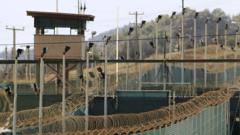The U.S. Court of Appeals has annulled a plea deal involving Khalid Shaikh Mohammed and others, putting the long-winded 9/11 trial back into uncertainty and potentially setting the stage for a death penalty case.
Court Reverses Plea Agreement in 9/11 Terror Case, Igniting New Legal Turmoil

Court Reverses Plea Agreement in 9/11 Terror Case, Igniting New Legal Turmoil
A federal appeals court ruling dismantles a plea deal for key 9/11 suspects, paving the way for a potential new death penalty trial at Guantánamo Bay.
A federal appeals court made a significant decision on Friday, reversing a previously established plea agreement meant to address the 9/11 case. This ruling raises the possibility of resuming lengthy judicial proceedings aimed at securing a death penalty sentence for the mastermind of the attacks, Khalid Shaikh Mohammed, and two other defendants. The 2-to-1 verdict marks a critical moment for families desiring resolution in this prolonged legal saga, though it does not immediately initiate the conspiracy trial, as further appeals could arise.
The plea deal, negotiated in the summer of 2024 between a senior Pentagon official and the accused terrorists, was designed to facilitate life sentences in exchange for confessions to their roles in the attacks, thereby avoiding the arduous capital punishment process. However, shortly after its inception, Defense Secretary Lloyd J. Austin III nullified the contract, prompting a legal battle over its validity. While the presiding military judge initially sided with the deal, asserting that he was bound to it, the appellate court determined that the Defense Secretary possessed the legal authority to rescind the agreement.
Judges Patricia A. Millett and Neomi J. Rao of the U.S. Court of Appeals for the District of Columbia articulated that since no actions had been executed to fulfill the deal's terms, Austin's withdrawal was justified. The implications of this ruling not only complicate the timeline for the trial but also require the new judge, recently appointed following the previous judge's retirement, to sift through extensive case records and address essential issues, such as the admissibility of confessions allegedly obtained through torture. This ruling could signify a further extension of the already drawn-out legal proceedings concerning one of the most infamous terrorism cases in U.S. history.





















